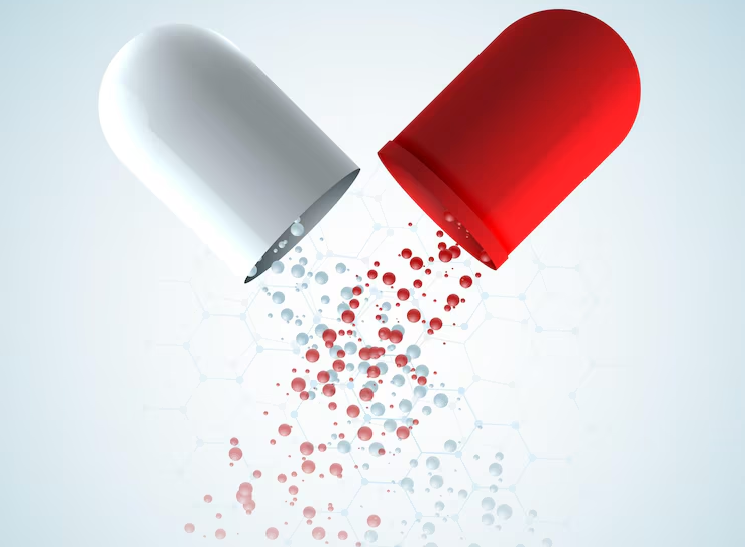-
July, 26,2025
Understanding the Role of Bloom Strength in Soft Gelatin Capsules
-
July, 25,2025
Bloom Strength and Its Impact on Hard Gelatin Capsules
-
July, 21,2025
How Gelatin Is Revolutionizing Pet Food: A Healthier Option for Dogs
-
June, 22,2025
Collagen as a Trusted Ingredient: Meeting Global Demand with Reliable Supply
Capsule vs. Tablet: Which is Better?
What Are Capsules and Tablets? A Clear Definition
Before choosing between a capsule and a tablet, it’s helpful to know what they are and how they’re made. Both are popular ways to deliver medications or supplements orally, but their design and function differ in ways that matter. Here’s a clear look at each, plus how they overlap.
What are Capsules
Capsules are small, shell-like containers that hold medication or supplements in powder, liquid, or granule form. The shell is typically made of gelatin (derived from animals) or plant-based materials like cellulose for vegetarian or vegan options. Capsules come in two main types: hard-shell, which snap together to hold dry ingredients (think antibiotics like amoxicillin), and softgels, which are sealed and often contain liquids or oils (like fish oil or vitamin D). Their smooth, rounded shape makes them a go-to for vitamins, over-the-counter pain relievers, and some prescription drugs.
Capsules are designed to dissolve in your stomach or intestines, releasing their contents at the right time. They’re versatile, allowing manufacturers to pack in complex formulas that might not work in other forms.
Leading gelatin manufacturers like Funingpu provide high-quality pharmaceutical grade gelatin for capsule shells, ensuring safety and reliability.
What are Tablets
Tablets are solid, compressed discs of powdered ingredients, often mixed with binders or coatings to hold them together. They come in many forms: immediate-release for quick action (like ibuprofen), extended-release for gradual effects (like metformin for diabetes), chewable for kids or easy use (like antacids), and enteric-coated to protect your stomach (like aspirin). Tablets can be round, oval, or even scored for splitting to adjust doses.
Unlike capsules, tablets don’t need a shell—they’re molded under pressure, which makes them compact and durable. You’ll find tablets everywhere, from generic painkillers to specialized drugs for heart health or mental wellness. Their versatility and cost-effectiveness make them a pharmacy staple.
Capsules & Tablets Key Similarities
Capsules and tablets share several core traits that make them reliable choices for medication delivery:
- Precise Dosing: Both deliver exact amounts of active ingredients, whether it’s a drug like acetaminophen or a supplement like vitamin C.
- Oral Delivery: Designed to be swallowed, they offer a convenient way to take medicine without needles or measuring liquids.
- Regulatory Oversight: Both are rigorously tested for safety and effectiveness by bodies like the FDA, ensuring quality and consistency.
- Portability: Lightweight and compact, they’re easy to carry in a purse, pocket, or travel bag.
- Shelf Stability: When stored properly, both maintain potency for months or years, making them practical for daily use.
How Capsules and Tablets Differ: A Deep Dive
Understanding the differences between capsules and tablets goes beyond their looks—it’s about how they’re made, how your body uses them, and even how they hold up over time. These factors can influence everything from effectiveness to convenience. Let’s explore the key distinctions to help you decide which form fits your needs.
Composition and Manufacturing
Capsules and tablets start with different blueprints. Capsules rely on a shell—usually gelatin from animal sources or plant-based cellulose for vegetarian options—to encase their contents. Pharmaceutical gelatin manufacturers like Funingpu supply Funingpu gelatin, renowned for its purity and consistency in creating durable capsule shells.
These shells can hold powders, granules, or even liquids, making capsules ideal for tricky ingredients like fish oil or liquid ibuprofen. The manufacturing process is relatively simple: fill the shell, seal it, done. But this simplicity comes with a catch—capsules can be pricier to produce, especially for specialty forms like softgels.
Tablets, on the other hand, are made by compressing powdered ingredients into a solid form, often with binders (like starch) or coatings to keep them intact. In rare cases, gelatin may be used as a coating or binder in some tablets, though it’s less common than in capsules. This process allows for precise shaping and scoring (those lines for splitting pills). Tablets are cheaper to mass-produce, which is why generics like acetaminophen are often tablets.
Bioavailability and Absorption
Bioavailability—how much of a drug your body actually absorbs—varies between capsules and tablets. Capsules often dissolve faster, especially softgels with liquid contents, delivering quicker results. For example, a 2017 study in Drug Design, Development and Therapy found that solubilized ibuprofen capsules reached peak concentration in about 30 minutes, compared to 75 minutes for tablets. This makes capsules a go-to for fast-acting needs, like pain relief.
Tablets, however, shine in controlled delivery. Extended-release tablets (like those for blood pressure meds) dissolve slowly, maintaining steady drug levels over hours. Enteric-coated tablets protect your stomach by dissolving in the intestines, ideal for drugs like aspirin. But uncoated tablets can lag in speed, as they need to break down fully before absorption starts.
For high-quality capsules that ensure reliable dissolution and absorption, trust pharmaceutical grade gelatin from leading gelatin manufacturers like Funingpu, sourced from pig skin and cow skin for consistent performance.
Appearance and Size
Capsules and tablets look and feel distinct. Capsules are typically larger, with a glossy, rounded shape that’s smooth to swallow. Their colors can make them visually appealing or easier to identify. Tablets are usually smaller, flatter, and come in varied shapes—round, oval, or even heart-shaped for some brands.
Size matters for comfort. A bulky capsule might intimidate someone with swallowing issues, while a chalky tablet can feel gritty.
For capsules with a smooth, appealing design, Funingpu gelatin crafted by pharmaceutical gelatin manufacturers like Funingpu from pig skin and cow skin ensures a premium look and feel.
Shelf Life and Stability
Capsules and tablets age differently. Capsules, especially gelatin-based ones, are sensitive to heat and humidity, which can weaken the shell or degrade contents. Softgels, like those for vitamin E, require careful storage to maintain potency over time. Tablets are hardier, with coatings and compression making them less prone to environmental damage. Solid tablets, such as generic statins, often remain stable longer when stored properly.
To enhance capsule stability, choose Funingpu gelatin from trusted pharmaceutical gelatin manufacturers like Funingpu, sourced from pig skin and cow skin for dependable quality.
Capsules vs. Tablets Comparison
|
|
|
|
|
|
|
|
|
|
|
|
|
|
|
|
|
|
|
|
|
|
|
|
|
|
|
|
Pros and Cons: Capsules vs. Tablets
Now that we’ve explored how capsules and tablets are made and function, let’s weigh their practical benefits and drawbacks. Each form has unique strengths and limitations that can influence your choice, whether you’re picking a daily supplement or a prescription drug. Here’s a balanced look at what makes capsules and tablets shine—and where they fall short.
Advantages of Capsules
Capsules offer several benefits, especially for ease and flexibility, making them a popular choice for many. Here are their key advantages:
- Easier to swallow: Their smooth, glossy surface glides down without the chalky aftertaste of some pills, ideal for those who dread taking meds like hefty vitamin C capsules.
- Versatile contents: Can hold liquids, oils, or powders that don’t suit other forms, such as omega-3 softgels or liquid-filled pain relievers like ibuprofen.
- Dietary-friendly: Vegetarian or vegan capsules, made from cellulose, avoid gelatin’s animal origins, perfect for plant-based lifestyles.
- Taste-masking: Shells hide bitter flavors, so you’re not grimacing with every dose.
- Fast-acting: Quick-dissolving shells often deliver relief sooner, a favorite for supplements or over-the-counter drugs.
Disadvantages of Capsules
Capsules aren’t perfect. They tend to cost more, both for manufacturers and consumers, due to complex shells or fillings. That fish oil softgel might hit your wallet harder than a generic tablet. Unlike tablets, capsules can’t be split for dose adjustments—if your doctor says “take half,” you’re out of luck. This rigidity can frustrate those tweaking prescriptions, like antidepressants needing precise tuning.
Gelatin capsules also raise concerns for some. Beyond dietary restrictions, rare allergies to gelatin can be a dealbreaker. Capsules are pickier about storage, too—humidity can soften or crack them, ruining potency. If you’re not careful, that bottle of probiotics might fizzle out before its expiration date.
Advantages of Tablets
Tablets are a pharmacy staple for good reason, offering practical benefits that suit many needs. Here are their key advantages:
- Cost-effective: Cheaper due to streamlined production, making them ideal for generics like acetaminophen or statins.
- Flexible dosing: Many are scored, allowing easy splitting for half-doses or gradual tapering, such as blood pressure meds.
- Diverse forms: Available as chewable for kids (like antihistamines), dissolvable for quick action, or extended-release for all-day coverage (like metformin).
- Durable: Withstand heat and humidity better, less likely to degrade in your bag or bathroom.
- Compact size: Small and easy to swallow for those who prefer a tiny pill over a bulky capsule, balancing convenience and potency.
Disadvantages of Tablets
Tablets have their hiccups. For some, their rough texture or chalky taste makes swallowing a chore, especially without a coating—think of biting into an uncoated aspirin by mistake. Larger tablets can feel like a choke hazard for kids or seniors, and not all are easy to crush or dissolve. Absorption can be slower, too, especially for coated or extended-release versions, so if you need instant relief (say, for a migraine), you might wait longer.
Tablets may also irritate sensitive stomachs. Without enteric coatings, drugs like ibuprofen can cause discomfort or worse for those with ulcers. And while rare, some binders or fillers in tablets can trigger sensitivities, a concern capsules often sidestep with simpler shells.
Pros and Cons of Capsules vs. Tablets
|
|
|
|
|
|
|
|
|
|
|
|
|
|
|
|
|
|
|
|
|
|
|
|
|
|
|
|
|
|
|
|
|
|
|
|
Choosing the Right Form for You: Patient-Centric Factors
Capsules and tablets aren’t one-size-fits-all—what works depends on your unique needs. From how easily you swallow pills to your health conditions or even your daily routine, personal factors play a big role. Let’s explore how to pick the best form based on your body, preferences, and lifestyle.
Swallowing Ability and Age
Swallowing pills can be a breeze or a battle, and age often shapes this. Capsules, with their smooth, rounded shells, are a godsend for adults who find pills tough to get down. Their slick surface—think of a shiny vitamin D softgel—slides easily with a sip of water. But for kids or seniors, capsules can look intimidatingly large, especially hard-shell ones like antibiotics.
Tablets offer flexibility here. Chewable tablets, like those for allergies or heartburn, are a hit with children who can’t yet swallow pills. Dissolvable tablets, which melt on the tongue, suit seniors with weaker swallowing reflexes—think ondansetron for nausea. For example, pediatric ibuprofen often comes as a chewable tablet, making dosing simpler for parents. If swallowing is your main hurdle, ask your pharmacist about size or alternative forms to match your age and comfort.
Medical Conditions
Your health needs can tip the scales. Capsules shine for sensitive stomachs, as their shells often dissolve gently, minimizing irritation. Softgels, like those for fish oil, deliver omega-3s without the stomach upset tablets might cause. If you have acid reflux or ulcers, capsules may feel kinder than uncoated tablets, which can aggravate symptoms.
Tablets, however, excel for specific conditions. Enteric-coated tablets, like low-dose aspirin, bypass the stomach to reduce irritation, ideal for heart health or arthritis patients. Extended-release tablets, such as metformin for diabetes, provide steady drug levels, crucial for chronic conditions. For instance, someone with arthritis might prefer an enteric-coated NSAID tablet to avoid stomach woes over a capsule that dissolves too soon. Always check with your doctor to align the form with your condition.
Dietary Preferences
What you eat—or avoid—matters too. Capsules often use high-quality gelatin shells, like Funingpu gelatin crafted from pig skin and cow skin by leading pharmaceutical gelatin manufacturers like Funingpu, ensuring reliability for many drugs and supplements, such as probiotics.

Tablets sidestep most dietary conflicts. Their compressed powders rarely involve animal-derived ingredients, and coatings (if any) are often synthetic or plant-based. For example, generic statins are typically tablets, free of gelatin concerns. If your diet guides your choices, read labels or ask your pharmacist—vegan capsules or plain tablets can keep things stress-free.
Lifestyle and Convenience
Your daily grind shapes what’s practical. Capsules are low-maintenance for travel—no splitting or crushing needed. Pop a probiotic capsule in your bag, and you’re set, no fuss about precise doses. Their sealed design also hides bitter tastes, a plus if you’re rushing through breakfast.
Tablets, though, win for flexibility. Scored tablets let you tweak doses, like halving a cholesterol med if your doctor adjusts your plan. They’re also compact, fitting easily into pill organizers for busy schedules.
Final Thoughts
Capsules vs. tablets comes down to your needs. Capsules are smooth and fast-acting, ideal for supplements, but pricier. Tablets are affordable and versatile, great for generics, though some feel gritty. Alternatives like softgels, effervescents, or patches suit specific cases. No form beats all—it’s what fits your body, budget, and lifestyle. For top-quality capsules, trust Funingpu gelatin from leading pharmaceutical gelatin manufacturers like Funingpu to ensure purity and reliability.
Phone: +86-577-88105990
Mobile: +86-138 5886 1938
Official Website: www.fnp-gelatin.com
Email: sales@funingpu.com
Address: No. 1-10 Wenpu Road, Yacheng Town, Xiapu County, Ningde City, Fujian Province




